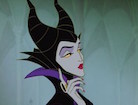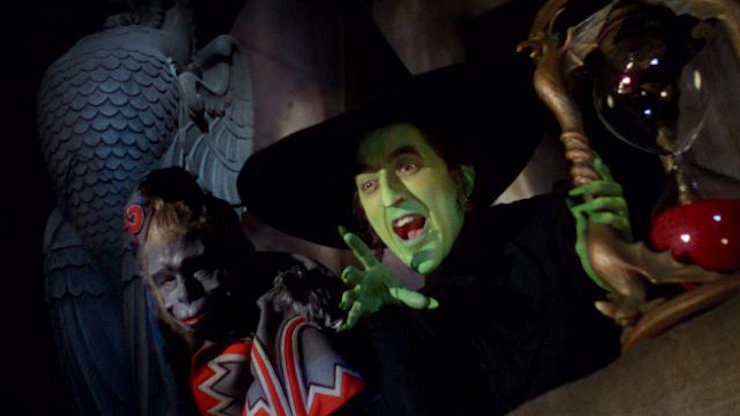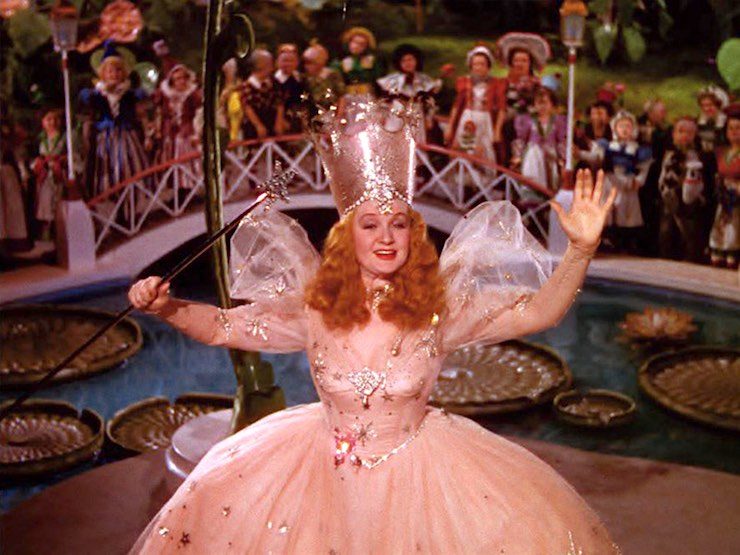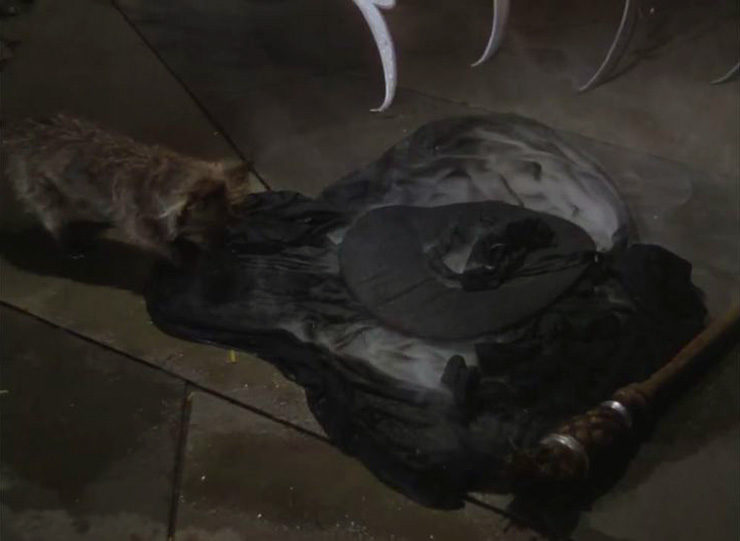Powers.
Fictional witches come in many forms—good and bad, of the East and of the West, Baba Yaga and Sabrina. They live in towers, or in boarding schools, or in castles, or in the woods. They eat children or they brew tea. But they all have one thing in common: powers.
The power to ride across the sea in a teacup. The power to disguise their withered husks as young and beautiful. The power to make monkeys fly.
When we write witches into our stories, that is what we’re writing about: power. When we write witches, we are writing about our expectations of women, and what we hope—and fear—they would do if they had access to power. Fictional witches act as ciphers that help us understand something that seems at once mysterious and brilliant and sinister: a woman’s ultimate, unlimited potential… realized.
Some of us write witches who use their powers to perform small, domestic tasks—tending to illnesses, baking really really good bread, sweeping the floor without a broom. These witches don’t complain. They’re satisfied: they don’t see any need for acclaim, recognition, institutional authority. They’re content on their own in the woods or in the village, brewing nettle tea and making pasta for their neighbors, or drifting around inside bubbles. They don’t have a family, and they don’t have children of their own—but lonely? Never. They have cats and crows to keep them company, and they have the people of the local villages to support. They have the occasional lost farmgirl to guide, and that’s enough for them. They don’t want money or economic independence; so long as they have enough to eat and a warm fire to put their feet up next to, they’re content to care for people. Their magic is focused on other people and perhaps the occasional sparkly dress. They’re pleased with a life of understatement, of service. Of soft-spoken humility. They are the ultimate mothers, grandmothers, godmothers, housewives, and maidservants to the world of the un-magic. These are the Good Witches.
Then there are the Frivolous Witches—the Sabrinas and the Louise Millers, rapping teenaged fashionistas who use their powers for status and wind up hating the results. These witches learn—or never seem to learn, but we know that they ought to learn—that power is more trouble than it’s worth. They are young and frustrated. They frequently wind up wishing that they had never developed their powers in the first place. They are what we expect teenage girls to be, and the ultimate moral of their story is the thing towards which our culture constantly guides teenage girls: you can’t win, no matter what you do, and the harder you try, the farther you’ll fall. They eventually discover that the only righteous path open to them is that of the Good Witches, maternal and kind and yielding. They discover that they are supposed to take that path, even if they secretly yearn for something… else.
Finally, there are the witches who will never be satisfied with the power they have. Once they have a taste, they’ll want more—they’ll hunger. Marriage won’t satisfy them, and service won’t satisfy them. It will never be enough for these witches to control the forces of the cosmos. These witches will build castles and towers, and they’ll peer out over the kingdoms of men with a hungry eye. They’ll let their hair get wild and they’ll howl into the wind, furious that they don’t yet have a throne. Or they’ll have a throne, and still, they’ll find dissatisfaction in something as small as a girl more beautiful than they are. They’ll demand independence. They’ll be childless, or the only children they’ll have will be the ones they steal. They’ll demand more than they have, and they won’t stop demanding until the world itself is softening in their cauldron.
These, of course, are the Bad Witches. They’re the scary witches. They are villainesses of the highest order, and they’re frequently served up as cautionary tales. What happens to witches when they have power and they use it for personal gain? Inevitably, they enjoy a brief stint as a wondrous and terrifying despot—but then they fall, usually to fire or humiliation.
Witches serve as a tidy packet of expectations for our consumption, and outcomes go hand-in-hand with those expectations. Here, the stories say, is a woman with power. Finally! What you’ve all been secretly wanting, all your lives! Power! Even more power than mortal men. Now that this woman has that power, what will she do with it? What will become of her?
These outcomes reveal whether we are supposed to be hopeful or fearful. The Good Witches—the humble, the meek, the kind, the patient, the servile—they get to live. They represent a hopeful outcome. They’re never displayed as allegorical representations of unrealized potential. Instead, these Good Witches are written as signposts of virtue and hope. They have power, but they don’t use it for anything big or showy. It’s comforting: these witches support the status quo. They remind us of the caregivers we’ve looked to all our lives; we would feel comfortable asking them for help. If women were to get their hands on power, these stories say, perhaps they would simply continue doing what women do. Perhaps they would keep quietly taking care of everyone around them. It wouldn’t be so bad. It’s not so very frightening to consider letting them have that power, is it?
The Bad Witches, meanwhile, represent a fearful outcome. They’re the cold sweat in the middle of the night, sitting bolt-upright in bed: if you give them power, they will stop being women; they will become monsters. They turn ugly and hungry and they use that power as power has been used against them. They seek vengeance. They seek satisfaction. They seek blood. They reach beyond their grasp, and it breaks them. They grow vain and cold and imperious. They try to act like Kings, and in the end, they simply have to die. They have to die as retribution for making us afraid—and as justification for our fear.

Remember, the stories tell us.
Look at what happens, and remember.
But in recent years, we have begun to see another way—the Hermione Grangers and the Tiffany Achings represent a new, ambiguous generation of witches in modern media. We see in them the seeds of power and ambition and potential, and we wait for them to fall—but they don’t. They are allowed to flourish and grow. They are nurtured, and they reach for things, and they don’t lose track of what’s important to them even as they become more than what they once were; even as they become more than what we expected them to be. These witches—these few, great witches—are just like all witches, in that they are written with an eye to what might happen if women are given access to unlimited power. And they are unique among hundreds of witches across the entire history of storytelling, because they alone point to a truly hopeful possibility: that a witch could use her unlimited power for progress, and for change. For freedom, and for justice, and for growth.
They outline a new narrative for witches—that they might use their powers not for Good, and not for Evil, but for Greatness. And they let us ask again the question we have always been asking of witches: with access to unlimited power, what might they become?
Sarah Gailey is too witches. Her fiction has appeared in Mothership Zeta and Fireside Fiction; her nonfiction has been published by Mashable and Fantasy Literature Magazine. You can see pictures of her puppy and get updates on her work by clicking here. She tweets @gaileyfrey. Watch for her debut novella, River of Teeth, from Tor.com in 2017.












